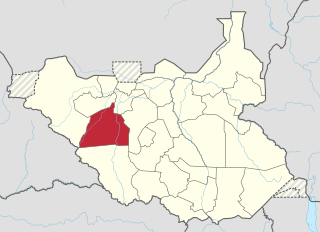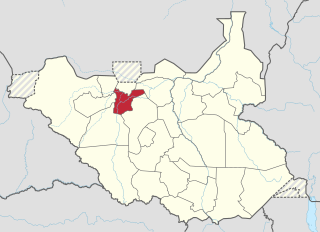Related Research Articles

Juba is the capital and largest city of South Sudan. The city is situated on the White Nile and also serves as the capital of the Central Equatoria State. It is the world's newest capital city to be elevated as such, and had a population of 525,953 in 2017. It has an area of 52 km2 (20 sq mi), with the metropolitan area covering 336 km2 (130 sq mi).

Wau is a city in northwestern South Sudan, on the western bank of the Jur River, that serves as capital for Western Bahr el Ghazal. It lies approximately 650 kilometres (400 mi) northwest of the capital Juba. A culturally, ethnically and linguistically diverse urban center and trading hub, Wau is also the former headquarters of Western Bahr el Ghazal.

Tonj is a city in South Sudan.
Kuol Manyang is a South Sudanese politician. He is a member of the SPLM. He became governor of Jonglei state on 15 December 2007, following the first former governor, Philip Thon Leek from Dinka Bor, to curb cattle raiding and abduction of children in the region.

Aweil is a city in South Sudan and the capital of the Northern Bahr el Ghazal.
Kuajok, also spelled as Kuacjok or Kwajok, is a city in South Sudan, and the capital of Warrap State.
Ramciel is a location in South Sudan that will serve as the site of the future national capital. John Garang, the first president of Southern Sudan, allegedly wanted to place the national capital in Ramciel during his administration, but he died before South Sudan achieved independence and its largest city of Juba became the capital instead.

South Sudan does not have an extensive rail system. Current rail infrastructure, which was constructed between 1959–1962, and was left over from the previous Sudan government is in a serious state of disrepair. It consists of a 248 kilometers (154 mi) narrow-gauge, single-track line that connects Babonosa (Sudan) with the city of Wau in South Sudan. The line was left in poor condition after the Second Sudanese Civil War after several parts of it were mined; the line was fully rehabilitated with United Nations funds.
University of Bahr El-Ghazal (UBG) is a university in South Sudan located in Wau, the capital of Western Bahr El Ghazal State.

Ann Itto Leonardo is a South Sudanese politician. She was previously the Minister of Agriculture and Forestry for the South Sundanese government, as well as the acting secretary-general of the Sudan People’s Liberation Movement.
Ethnic violence in South Sudan has a long history among South Sudan's varied ethnic groups. South Sudan has 64 tribes with the largest being the Dinkas, who constitute about 35% of the population and predominate in government. The second largest are the Nuers. Conflict is often aggravated among nomadic groups over the issue of cattle and grazing land and is part of the wider Sudanese nomadic conflicts.
The Luwo are a Nilotic ethnic group that live in the western parts of South Sudan. They are part of a larger group of ethno-linguistically related Luo peoples of East Africa. They speak the Jur language which is a Northern Luo language.

Corruption in South Sudan is among the worst in the world. The nation's elites have developed a kleptocratic system that controls every part of the South Sudanese economy. This system has taken shape quickly in a relatively short period, South Sudan having won self-rule in 2005 while remaining part of Sudan, and having been accorded full sovereignty in 2011. The nation was ranked last on Transparency International's 2021 Corruption Perception Index, which ranks 180 countries by their perceived level of public-sector corruption.

Wau State was a state in South Sudan that existed between 2 October 2015 and 22 February 2020. It was located in the Bahr el Ghazal region, and was part of the former state of Western Bahr el Ghazal. Wau State bordered Aweil State, Gbudwe State, Gogrial State, Lol State, and Tonj State.

Tonj State was a state in South Sudan that existed between 2 October 2015 and 22 February 2020. It was located in the Bahr el Ghazal region and it bordered Wau to the west, Gbudwe to the southwest, Gogrial to the northwest, Northern Liech to the northeast, Gok and Southern Liech to the east, and Western Lakes to the south and east.

Gogrial State was a state in South Sudan that existed between 2 October 2015 and 22 February 2020. It was located in the Bahr el Ghazal region and it bordered Twic to the north, Aweil East to the northwest, Aweil to the west, Wau to the southwest, Tonj to the southeast, and Northern Liech to the northeast.

Armed clashes took in Wau State from late June 2016 to January 2019 between the Dinka-dominated Sudan People's Liberation Army (SPLA) and local opposition forces, consisting of tribal Fertit militias as well as fighters claiming allegiance to Riek Machar. It is unclear to what extent these rebels were actually part of the SPLM-IO or acting independently while using the SPLM-IO's name. The clashes resulted in the arrest of the state's governor, Elias Waya Nyipuoc, widespread death and destruction in the state capital, Wau town, and the displacement of up to 150,000 people.
Peter Par Jiek was a brigadier general of the Sudan People's Liberation Army (SPLA), and veteran of the Second Sudanese Civil War. In the course of that conflict, Par fought under Riek Machar with several rebel and pro-government groups, and eventually became a powerful militia commander in Unity State. In that region, he established his own fiefdom and gained some notoriety for his rivalry with another rebel leader, Peter Gadet. Even though he had followed Machar during the whole Second Sudanese Civil War until 2005, Par sided with President Salva Kiir Mayardit upon the outbreak of the South Sudanese Civil War in 2013. Leading pro-government counter-insurgency forces in Wau State since 2014, Par was eventually ambushed and killed by SPLM-IO rebels loyal to Machar in 2017.
Babanusa-Wau Railway is an international railway line from the town of Babanusa in Sudan to South Sudan's second largest city Wau. It terminates at Wau Railway Station. The 1,067 mm gauge railway line is 445.5 km long. 195.5 km are running on Sudanese territory, 250 km on South Sudanese territory. The South Sudanese section of the railway line is currently the only railway in South Sudan.
Isaiah Kulang Mabor DengDak Anguany was a South Sudanese politician who was Minister for Communications, Transport and Roads and member of the People's Regional Assembly, in the capital of Juba, serving as Speaker of the House between 1979 and 1980. Kulang was a prominent member of the Southern Front by then and in the late 1980s he participated actively in founding the United Sudan African Party (USAP).
References
- ↑ "Wau State Authority Warns Public Over Illegal Occupation of Railway Land > Gurtong Trust > Editorial". gurtong.net. Retrieved 2017-10-13.